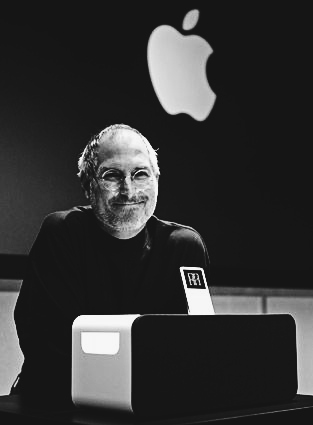For the previous Tales of Mastery article, click here.
“Here’s to the crazy ones. The misfits. The rebels. The troublemakers. The round pegs in the square holes. The ones who see things differently. They’re not fond of rules. And they have no respect for the status quo. You can quote them, disagree with them, glorify or vilify them. About the only thing you can’t do is ignore them. Because they change things. They push the human race forward. And while some may see them as the crazy ones, we see genius. Because the people who are crazy enough to think they can change the world are the ones who do.”
Apple’s Think Different Commercial, 1997
REBELLIOUS BY NATURE

One could easily remember Steve Jobs by his rants, his brutal leadership, his prickly attitude towards life. He believed that everyday rules simply didn’t apply to him. He parked in handicapped spaces just because he could, and refused to have license plates on his car.
“Nice” isn’t the best adjective to describe Jobs. At times he was willing to manipulate others in order to get what he wanted. He wasn’t an engineer. Neither was he a designer. But yes, he was a visionary. A leader.
A line in the movie Steve Jobs, though fictional, describes him well : “The musicians play their instruments. I play the orchestra.”
His personal heroes, namely Dylan, Einstein, Picasso, Chaplin, Lennon, and Gandhi were ones who defied failure, challenged the status quo, who were willing to bet their career on doing things in a different way. Jobs had always thought of himself as standing on the same pedestal as his heroes.
In his binary view of the world, a product was either really amazing or simply sucked. The same was true for people. He lacked the filter to sympathize or imagine what it was like to be in another person’s shoes. But that allowed him to be very honest in situations where most leaders would relent to sugarcoating the truth. And from that, he was able to get the best work done from his team.
“You did the impossible, because you didn’t realize it was impossible”, described Debi Coleman about working under Jobs.
THE HUMAN ELEMENT

Perhaps the most impressive thing about Steve Jobs was his lifelong fascination of the intersection between art and technology, design and engineering. In a world where we commonly see those two fields as separate and contrasting, Jobs saw them as a great pair, that they fuel one another. Just as how the greats such as Leonardo da Vinci and Michelangelo saw them.
As a young man, Jobs loved electronics. Yet he also loved liberal arts. He would spent an enormous time with Steve Wozniak hunting down Dylan bootleg tapes, buying brochures of Dylan lyrics and staying up late with him to interpret what they could mean. “Dylan’s words struck chords of creative thinking”, said Jobs.
As he grew older, this fascination would find its way in his work, in his obsession with details and perfection. A lesson that he learned from his father was to always make sure that even the unseen parts of his products are beautifully made, although no one would open them up and see. As a result, an Apple product isn’t a commodity. It’s a piece of craftsmanship. It isn’t cold and lifeless, but it has a human essence to it.
Jobs said that,
“The older I get, the more I see how much motivations matter. The Zune was crappy because the people at Microsoft don’t really love music or art the way we do. We won because we personally love music.”
When Jobs felt something was wrong with a product, it was because he himself didn’t love it. He wouldn’t put it out in the world until he was sure that it was the best it could possibly be. And in Jobs’s sight, “possible” is a long, long way.
He thought of himself as an artist, and he wanted his team to think of themselves the same way.
He understood what people wanted. Such as in creating the iPod and iTunes, Jobs believed that people had an emotional connection to the songs they loved. They wanted to own them, not rent them. Jobs understood this because he himself personally loved music.
He once sneered that Bill Gates liked to portray himself as a man of the product, but he isn’t. “Microsoft never had the humanities and liberal arts in its DNA.” he said, “Even when they saw the Mac, they couldn’t copy it well. They totally didn’t get it.”
EMBRACE SIMPLICITY

There’s a maxim by Leonardo da Vinci that says, “Simplicity is the ultimate sophistication.” Jobs was a firm believer of that.
It sounds easy, but it’s not.
Ironically, simplicity isn’t simple. It comes from conquering complexities, not ignoring them. It comes from understanding the real essence of the product and getting rid of the things that are not essential. And that takes a lot of hard work. It involves going really deep.
Biographer Walter Isaacson wrote of Jobs in working on the iPod :
“His main demand was ‘Simplify!’ He would go over each screen of the user interface and apply a rigid test : If he wanted a song or a function, he should be able to get there in three clicks. And the click should be intuitive. If he couldn’t figure out how to navigate to something, or if it took more than three clicks, he would be brutal.”
Unlike other companies, in Apple, design dictated engineering. Jobs would approve the design, then engineers would have to make the boards and components fit.
Head of design team, Jony Ive recounted, “We wanted to get rid of anything other than what was absolutely essential. We kept going back to the beginning, again and again. Do we need that part? Can we get it to perform the function of the other four parts?”
USE YOUR HANDS

“I always understood the beauty of things made by hand. I came to realize that what was really important was the care that was put into it. What I really despise is when I sense some carelessness in a product.”
It’s commonplace to hear from professionals that you get a different insight when you’re using your hands and keeping things as physical as possible in your work. In writing his biographies Walter Isaacson would print out the pages and correct them from there, because he felt that he could find mistakes that he couldn’t see by staring at a computer screen all day.
For one thing, Jobs hated Powerpoint presentations. He thought that people who knew what they were talking about wouldn’t need any Powerpoint slides. He loved things such as product models that he could feel.
His team learned that very often a product looks great on CAD (computer-aided design). But when they make a model of it, they realize that it’s rubbish. And they would have to brace themselves for Jobs’s stinging rants.
FOCUS ON MAKING PERENNIAL SELLERS

It was always Jobs’s main priority to make a dent in the universe, to create revolutionary products. He literally wanted to change the world.
In order to do that, he constantly had to decide what not to do. He said no to a thousand projects so that they could work on just a few that really, really matter. He would focus on the big picture by asking, “Which ones do I tell my friends to buy?”
Unlike Microsoft, he said no to licensing their software for other companies to use, because he wanted to protect Apple’s image. He wanted Apple to be a lasting company.
“I hate it when people call themselves ‘entrepreneurs’ when what they’re really trying to do is launch a startup and then sell or go public, so they can cash in and move on. They’re unwilling to do the work it takes to build a real company, which is the hardest work in business. That’s how you really make a contribution and add to the legacy of those who went before. You build a company that will still stand for something a generation or two from now.”
And of course, as a business-minded person, Jobs believed that a good company must impute — It must convey its values and importance in everything it does, from packaging to marketing.
If it weren’t for Jobs, the first computer that he and Wozniak created would have been sold at hobby shops, and Apple would simply be a funny name for a company. Jobs was the catalyst for their legendary marketing campaigns, and later on, for building Apple stores all around the world. Before that, Apple products were sold in normal computer stores, alongside its competitors.
Packaging is also a very important thing, at least in Apple. Why? — Because people DO judge a book by its cover. That’s why books have covers.
Ive said, “Steve and I spend a lot of time on the packaging. I love the process of unpacking something. You design a ritual of unpacking to make the product feel special. Packaging can be theater, it can create a story.”
INNOVATE AND EVOLVE

In a conversation he had with Walter Isaacson, Jobs also talked about how important it was for Apple to change and innovate. He related to a story about his hero, Bob Dylan, who evoked a great deal of controversy for abandoning the folk genre.
He said,
“You always have to innovate. Dylan could have sung protest songs forever and probably made a lot of money, but he didn’t. He had to move on, and when he did, by going electric in 1965, he alienated a lot of people. His 1966 Europe tour was his greatest. He would come on and do a set of acoustic guitar, and the audiences loved him. Then they would do an electric set, and the audience sometimes booed.
There was one point where he was about to sing “Like a Rolling Stone” and someone from the audience yells “Judas!” And then Dylan says, “Play it f*cking loud!” And they did. The Beatles were the same way. They kept evolving, moving, refining their art. That’s what I’ve always tried to do — keep moving. Otherwise, as Dylan says, if you’re not busy being born, you’re busy dying.”
Adapting to the tides of technological change, he taught the people at Apple to not be afraid to cannibalize their own products — Meaning that the sales of their new products “eat up” the sales of their previous ones. He would say, “If we don’t cannibalize our products, then someone else will.”
MEMENTO MORI

Jobs was a person who didn’t hide away from the thought of death. From remembering that death could come anytime, he had a sense of urgency of what he wanted to contribute — That there were many important things for him to get done.
Maybe that’s the main reason why he thought so differently. Maybe that’s the reason why he wasn’t afraid to do the difficult things.
Although cancer in his later years didn’t temper down his arrogance and prickly attitude, he had an enormous drive to leave a meaningful legacy to the world.
“We all have a short period of time on this Earth. We probably only have the opportunity to do a few things really great and do them well. None of us has any idea how long we’re going to be here, nor do I, but my feeling is I’ve got to accomplish a lot of these things while I’m young.”

